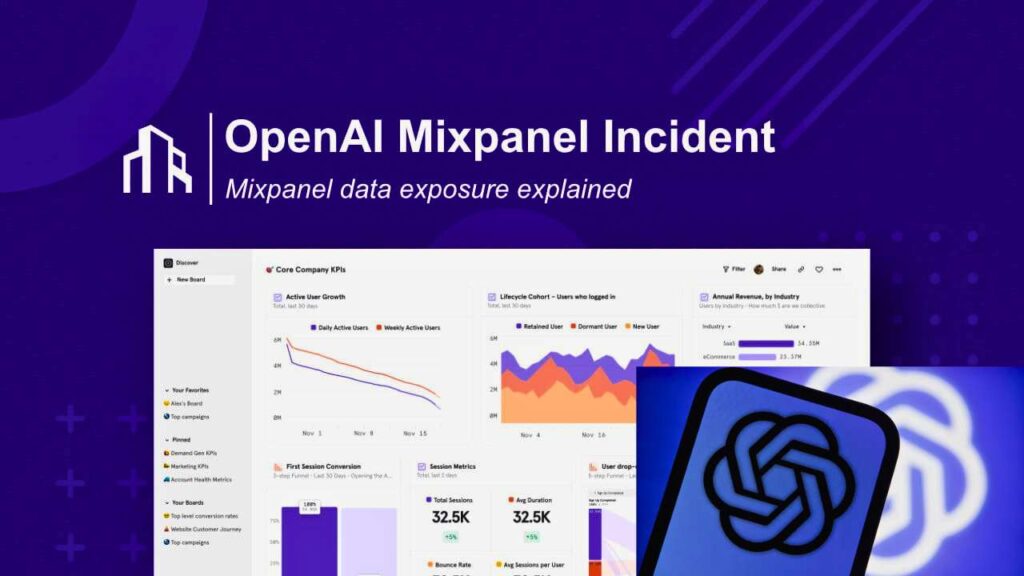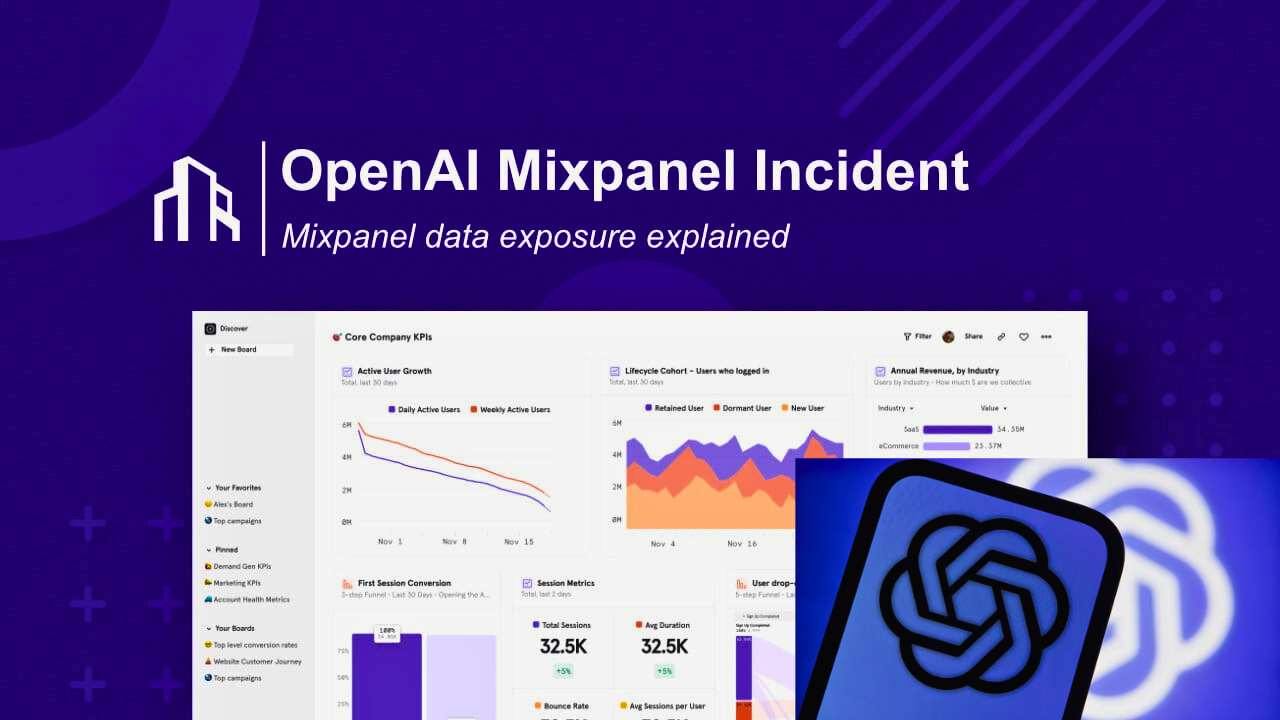OpenAI has shared details about a recent security incident involving Mixpanel, the analytics provider that previously handled web-tracking for the API platform interface. The company confirmed that the intrusion happened inside Mixpanel’s systems, not OpenAI’s infrastructure.
Only a small set of analytics-level user information was exposed—nothing related to API keys, passwords, chat data, payment information, or sensitive identification.
This article summarises what happened, which user information may be involved, and what OpenAI has done in response, based on consistent reporting from multiple technology publications.

1. What Exactly Happened?
The incident began when Mixpanel detected unauthorized access to a portion of its systems.
During the intrusion, an attacker exported a dataset linked to analytics tracked on platform.openai.com.
What OpenAI confirmed:
- The breach happened only within Mixpanel’s environment.
- OpenAI’s systems were not compromised.
- No sensitive API-related information was accessed.
Mixpanel notified OpenAI after the breach and later shared the affected dataset for review.
2. What Data Was Potentially Exposed?
Based on OpenAI’s review, the exposed data was limited to analytics-related information such as:
| Type of Data | Details |
|---|---|
| Account Name | Name provided on the API account |
| Email Address | Email used to sign up for API account |
| Approximate Location | City/State/Country inferred from browser |
| Device Information | Operating system + browser details |
| Referring URLs | Websites leading to the API interface |
| User/Org IDs | Internal identifiers used for analytics |
None of this information included passwords, API keys, payment data, or chat content.
3. Was ChatGPT or Other OpenAI Products Affected?
No.
The incident does not involve:
- ChatGPT accounts
- Chat history
- API usage logs
- Authentication tokens
- Payment information
- Government IDs
- Sensitive parameters
OpenAI has clearly stated that this was not a breach of any core systems.
4. How OpenAI Responded Immediately
After learning about the intrusion, OpenAI took several steps:
- Removed Mixpanel from all production systems
- Reviewed the affected datasets shared by Mixpanel
- Initiated direct notifications to impacted users
- Started broader security audits across all third-party vendors
- Increased security requirements for external partners
OpenAI also stated it has found no evidence of misuse so far but will continue to monitor for suspicious activity.
5. What Users Should Do Now
Even though no critical data was leaked, OpenAI recommends basic security precautions:
Stay alert for phishing attempts
Attackers may use names and emails to send misleading messages.
Verify all official communication
Ensure emails claiming to be from OpenAI come from genuine domains.
Enable multi-factor authentication (MFA)
Although passwords were not exposed, MFA adds an additional safety layer.
Avoid sharing credentials through email or messages
OpenAI will never ask for:
- API keys
- Passwords
- Verification codes
- Login tokens
6. Why This Incident Matters
The Mixpanel incident highlights a growing truth in cybersecurity:
breaches often occur through third-party providers, not the main platform.
OpenAI has publicly committed to tightening vendor-security evaluations and raising expectations for partners handling any type of analytics data.
7. Internal Links You Can Add (For WordPress SEO)
(Choose any based on what exists on your site.)
- How to Keep Your API Keys Safe: Best Practices for Developers
- Latest AI Security Trends Every User Should Know
- OpenAI Platform Updates and Security Improvements
- What Is Multi-Factor Authentication and Why You Should Use It
Related Articles You Might Like
- Valve Steam Machine Announced: Specs, Features, Price, and Release Date Revealed
- Top 5 Ways AI is Transforming the Future of Smartphones
- iQOO Neo 7 and Neo 7 Pro to Receive Android 16-Based OriginOS 6 Update in 2026
FAQs-OpenAI Mixpanel Security Incident
1. Did the OpenAI Mixpanel incident expose passwords or API keys?
No. The incident involved only analytics-level information. Passwords, keys, and tokens were not affected.
2. Were ChatGPT users impacted?
No, the incident only affected analytics related to API accounts.
3. Should users reset their passwords or rotate keys?
OpenAI has not recommended this because no sensitive credentials were exposed.
4. What data was included in the Mixpanel export?
Basic details such as name, email, browser type, and approximate location.
5. Is OpenAI still using Mixpanel?
No. OpenAI has completely removed Mixpanel from its production systems.
Conclusion
The Mixpanel security incident highlights the importance of strong third-party security controls. OpenAI has taken immediate steps to remove Mixpanel, notify users, and review its vendor ecosystem. While the exposed information was limited and not sensitive, users should remain alert to potential phishing attempts and ensure they follow basic account-security practices.
For deeper analysis and ongoing updates, continue reading at TechDigitalSpace.com.
Disclaimer
This article is based on publicly available information from credible news sources. Technical details may evolve as OpenAI or Mixpanel publish further updates. Always verify critical security information with official OpenAI communications.
Sources
Hi, I’m Simran Shah, a graphic designer and digital content creator with 4+ years of experience. I run two YouTube channels focused on AI, tech, mobiles, and automobiles — topics I’m truly passionate about.
My love for deep research started when I used to spend hours finding the best gadgets or information before making any decision. That’s when I realized I could help others save time by sharing my findings — both through well-researched content and visually compelling designs.
Now, through blogs, videos, and graphics, I do the research so you don’t have to — using tools like ChatGPT to make content clear, helpful, and time-saving.

